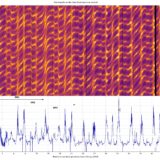Gaia tops one trillion observations
On 14 April 2018, about 10 days before the second Gaia Data Release, the spacecraft and daily data processing systems have reached yet another stunning milestone: the number of star transits has reached 100 billion! The Gaia satellite has two telescopes pointing to two regions of the sky separated by 106.5 degrees. The satellite spins at a rate of 6 hours per revolution with the two telescopes scanning a great circle and the stars continuously transiting the focal plane. Every day, Gaia instruments record about 70 million transits. A full transit includes an observation in the sky mapper (to...
read moreGaia’s snapshot of another galaxy (ESA, 20 April 2017)
Gaia’s snapshot of another galaxy Link: http://sci.esa.int/gaia/59023-gaia-s-snapshot-of-another-galaxy/ While compiling an unprecedented census of one billion stars in our Galaxy, ESA’s Gaia mission is also surveying stars beyond our Milky Way. A new image of M33, also known as the Triangulum galaxy, shows tens of thousands of stars detected by Gaia, including a small stellar census in its star-forming region NGC 604. This is a striking example of the mission’s potential to detect and characterise stars in nearby galaxies. Gaia’s view of the M33 galaxy. Credit:...
read moreFinal GENIUS meeting in Brussels (19 April 2017)
Final GENIUS meeting in Brussels Last April 19 the final review meeting of GENIUS (http://genius-euproject.eu/) took place at the Research Executive Agency (EC) in Brussels. After explaining all the achievements and success of the project, designed to boost the impact of Gaia, the team formed by 13 nodes in 9 countries received warm congratulations from the reviewer and the Project Officer. “GENIUS has opened the box of Gaia” in the words of the reviewer.
read moreLa misión Gaia y la historia de nuestra galaxia
Title: La misión Gaia y la historia de nuestra galaxia Authors: Carme Jordi, Eduard Masana Journal: Investigación y Ciencia, núm 487, abril 2017 Link: http://www.investigacionyciencia.es/revistas/investigacion-y-ciencia/numero/487/la-misin-gaia-y-la-historia-de-nuestra-galaxia-15116 La misión Gaia y la historia de nuestra galaxia La mayor cámara jamás enviada al espacio determinará con una precisión extraordinaria las posiciones, distancias, movimientos y propiedades de más de mil millones de estrellas de la Vía Láctea. ¿Por qué es tan importante este proyecto? Jordi, Carme Masana,...
read moreGender on Gaia DPAC (6 April, 2017)
Gender on Gaia DPAC Thursday, 6 April, 2017 Link to the web: http://gaiaverse.eu/fre_news/gender-on-gaia-dpac/ Home / News / Gender on Gaia DPAC The number of women entering the sciences and earning degrees is increasing in all fields but one: computer science. Despite progress, the under representation of women continues to be a problem in all narrow fields of science and engineering, except life science. The average of the International Astronomical Union statistics for 2015 is a 16% of female permanent positions in astronomy. Women remain severely underrepresented within the sub-field of...
read moreConferencia. Gaia: Tres años estudiando la Galaxia (Bilbao, 30 de Març)
Conferencia Gaia: Tres años estudiando la Galaxia Dirección: Sala Baroja del paraninfo de la Universidad del País Vasco – Abandoibarra Etorbidea, 3 (Bilbao) Fecha: 30 de marzo Horario: 18:30 Entrada gratuita hasta completar aforo Link a la web: http://www.pioneeringspace.sener/es/conferencia/mision-gaia-estudiando-la-galaxia Jordi Torra, catedrático de Astronomía y Astrofísica en la Universidad de Barcelona, Jordi Portell, investigador en el Instituto de Estudios Espaciales de Cataluña, y Diego Rodríguez, director de Espacio de SENER, participarán en la conferencia ‘Gaia:...
read more





